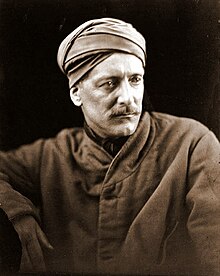Gifford Palgrave

William Gifford Palgrave(/ˈpælɡreɪv,ˈpɔːl-/;[1]24 January 1826 – 30 September 1888)[2][3]was an English priest, soldier, diplomat,traveller,andArabist.
Early life and education
[edit]Palgrave was born inWestminster.He was the son ofSir Francis Palgrave(born Jewish, converted to Anglican) and Elizabeth Turner, daughter of the bankerDawson Turner.His brothers wereFrancis Turner Palgrave,Inglis PalgraveandReginald Palgrave.He was educated atCharterhouse School,then occupying its original site nearSmithfield,and under the head-mastership of Dr.Saunders,afterwardsDean of Peterborough.Among other honours he won the school gold medal for classical verse, and proceeded toTrinity College, Oxford,where he obtained a scholarship, graduating First Class Lit. Hum., Second Class Math., 1846.
Early overseas travel and conversion to Catholicism
[edit]Palgrave went straight from college to India, and served for a time in the 8th Bombay Native Infantry, H.I.C. Shortly after this he became a Roman Catholic, was ordained a priest, joined the order of theJesuitsand served as a member of the order in India, Rome, and in Syria, where he acquired a colloquial command of Arabic.[4]
Palgrave convinced his superiors to support a mission to the interior ofArabia,which at that time wasterra incognitato the rest of the world. He also gained the support of the French emperor,Napoleon III,representing to him that better knowledge of Arabia would benefit Frenchimperialisticschemes in Africa and the Middle East.
Syria and Middle Eastern travels
[edit]Palgrave then returned to Syria, where he assumed the identity of a travelling Syrian physician.[4]Stocking his bags with medicines and small trade goods, and accompanied by one servant, he set off forNajd,in north-central Arabia. He traveled as aMuslim.The service he would do for the Society of Jesus and the French empire would be as a spy, not a missionary.
Palgrave became friendly with Najdi rulerFaisal bin Turkiwhile in Najd. Faisal's son andheir apparent,Abdullah,asked Palgrave to get himstrychnine.[5]Palgrave believed that Abdullah wanted it to poison his father. Palgrave was accused of espionage and was almost executed for his Christian beliefs.[4]
Later life and death
[edit]After travelling for a year from Syria, through Najd, and on to Bahrain and Oman, Palgrave returned to Europe, where he wrote a narrative of his travels. This narrative became a bestseller and has been reprinted many times. It makes no mention of the covert motives for his journey.
After writing this book, Palgrave made yet anothervolte-faceand renounced his vocation as a Jesuit priest in 1865. He then entered theBritish Foreign Officeand was appointed consul at Sukhum-Kale (Sukhumi) in 1866, and moved to Trebizond (Trabzon) in 1867. In 1868 he married Katherine, the daughter of George Edward Simpson ofNorwich,by whom he had three sons. He was appointed consul atSt. ThomasandSt. Croixin 1873, Manila in 1876, and in 1878 in newly liberatedPrincipality of Bulgaria,where he was appointed Consul-General.[6]In 1879 he was moved toBangkok.In 1884 he was appointed Minister Resident and Consul-General to Uruguay, where he served until his death in 1888.

Besides his work onCentral Arabia,Gifford Palgrave published a volume ofEssays on Eastern Questions,a narrative calledHermann Agha,a sketch ofDutch Guiana,and a volume of essays titledUlysses.
Since his death, some have cast doubt on the veracity of his travel accounts.St. John Philby,who retraced many of the routes Palgrave had traveled, suggested he may not have traveled as extensively as he claimed. Noting inaccuracies and discrepancies in his accounts, Philby accuses him of either basing his writing on secondhand accounts of local travelers, or fabricating them altogether.[7]
References
[edit]Footnotes
[edit]- ^Wells, John C.(2008).Longman Pronunciation Dictionary(3rd ed.). Longman.ISBN978-1-4058-8118-0.
- ^Jennifer Speake,ed. (2003).Literature of Travel and Exploration: G to P.Taylor & Francis. pp. 916–.ISBN978-1-57958-424-5.
- ^Kathryn Tidrick (1989).Heart Beguiling Araby: The English Romance with Arabia.I. B. Tauris. p. 84.ISBN9781850431350.
- ^abcPersonal Narrative of a Year's Journey through Central and Eastern Arabia (1862–63).1871.Retrieved24 September2013– via World Digital Library.
- ^Peter Hobday (1986).Saudi Arabia Today. An Introduction to the Richest Oil Power(2nd ed.). London: The Macmillan Press. p. 16.doi:10.1007/978-1-349-03214-3.ISBN978-0-333-21471-8.
- ^"CONSTITUTION de Principaute de Bulgarie. - Tirnovo, April 16/28, 1879".British and foreign state papers 1878 - 1879(in French). Vol. 70. London. 1886. pp.1303 - 1318.hdl:2027/mdp.35112103946069.Retrieved17 April2024– via HathiTrust.
{{cite book}}:CS1 maint: location missing publisher (link) - ^St. John Philby (1922).The Heart of Arabia: A Record of Travel & Exploration Vol 2(1st ed.). London: Ulan Press (2012). p. 117-156.doi:10.1038/112127a0.ISBN978-0331153002.
Sources
[edit]- Freeth, Zahra,&H.V.F. Winstone--Explorers of Arabia from the Renaissance to the End of the Victorian Era,Allen & Unwin, London, 1978
- Palgrave, W. G.:
- Personal Narrative of a Year's Journey through Central and Eastern Arabia (1862-1863),vol. I, Macmillan & Co., London, 1865 (full text available online, also reprinted many times)
- Personal Narrative of a Year's Journey through Central and Eastern Arabia (1862-1863),vol. II, Macmillan & Co., London, 1866 (full text available online, also reprinted many times)
- The Athenaeum,(No. 3181, October 13, 1888, pp. 483–84).
- This article incorporates text from a publication now in thepublic domain:Wood, James,ed. (1907).The Nuttall Encyclopædia.London and New York: Frederick Warne.
{{cite encyclopedia}}:Missing or empty|title=(help)
External links
[edit] Media related toWilliam Gifford Palgraveat Wikimedia Commons
Media related toWilliam Gifford Palgraveat Wikimedia Commons- Travels in Arabiafrom 1892, featuring William Gifford Palgrave
- The Penetration of Arabia: A Record of the Development of Western Knowledge Concerning the Arabian Peninsulafrom 1904 also features Palgrave
- Works by or about Gifford Palgraveat theInternet Archive
